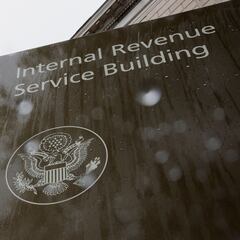What happens if I file my taxes a day late? Can I file an extension after it?
Tuesday 15 April 2025 is the deadline for submitting tax returns to the IRS for most US taxpayers. Missing that date could be costly. Here’s a look…

The 2025 Tax Season will wrap up for most US taxpayers on Tuesday 15 April 2025. That is the deadline to submit 2024 income tax returns. However, due to extreme weather events, some filers have been granted an automatic extension. Those that cannot make the deadline must apply for an extension by that date, which will give them another six months until 15 October.
But unless you are in one of the disaster declaration areas that received an automatic extension from the IRS, you’ll still be on the hook for any money they may owe. You need to pay any balance due, to the best of your knowledge, that you owe by Tax Day.
Missing the tax deadline and filing your tax return late can be an expensive proposition if you owe money to Uncle Sam. You could face penalties for filing late as well as late payment penalties and interest to boot.
What are the penalties for filing a late tax return?
Missing the April 15 filing deadline could result in the IRS imposing a failure-to-file penalty. The penalty is 5%, minus the failure-to-pay penalty when both apply, on any underpayment of taxes for each month, or part thereof, that a tax return is late. The penalty will max out five months after taxes are to be filed, April 15 or with an extension Oct. 15, and won’t exceed 25%. The late filing penalty is calculated based on the tax that remains unpaid after April 15 or, if an extension is granted, after Oct.15.
After more than 60 days have passed from the filing deadline, the IRS can impose the minimum failure-to-file penalty. In 2025, taxpayers who file late could face the lesser penalty of $510 or 100% of the tax required to be shown on the return.
ENDING TOMORROW: You can submit a free request for an extension to file a federal tax return using #IRS Free File. Free File is available to anyone requesting an extension, regardless of their income. See https://t.co/6DMpAMPXCB. pic.twitter.com/67vHeGhVqN
— IRSnews (@IRSnews) April 14, 2025
What is the penalty for failing to pay taxes?
The failure-to-pay penalty is 0.5% of the unpaid taxes per month, with a full monthly charge even if the taxpayer pays before the end of the month. For individual taxpayers, if a return is filed on time with an approved installment agreement, the penalty is 0.25% during the agreement period. However, if tax is not paid within 10 days of a notice of intent to levy or seize property the penalty is 1%. The penalty will be recurring until the tax is fully paid or until the maximum of 25% is reached.
In addition to the penalties, the IRS will start charging interest on any unpaid balance of taxes owed which will accrue and compound daily from April 18 until the balance is paid in full. The current interest rate for underpayments is 7% for Corporate and Non-Corporate filers which is calculated using the federal short-term rate plus three percentage points. Any outstanding penalties will also accrue interest while they remain outstanding so it is vital that you complete your tax return on time.
Won’t make the April 15 tax deadline? Get six more months to file your #IRS tax return: https://t.co/aO7gmxudbN pic.twitter.com/tsRefov8fT
— IRSnews (@IRSnews) April 13, 2025
What if I’m owed a refund, will I still be penalized?
There is no penalty for filing late if it turns out that you are owed a tax refund. However, the longer you wait to file the longer it will take to get your money back from the government. As well there is a three-year limitation to claim any tax refund that you have coming your way.
Likewise, taxpayers have three years to correct a tax return to claim any refund money they left on the table. If you file for an extension you will have from the date you filed your return with the IRS to claim any money you missed out on in your original filing. After the three-year period the federal government will keep any money that went unclaimed.
There are exceptions to the three-year refund rule. In the case of deductions for bad debt or worthless securities, taxpayers have seven years to claim a refund. The limit does not apply for those who are unable to manage their financial affairs due to physical or mental impairments.
Related stories
Get your game on! Whether you’re into NFL touchdowns, NBA buzzer-beaters, world-class soccer goals, or MLB home runs, our app has it all. Dive into live coverage, expert insights, breaking news, exclusive videos, and more – plus, stay updated on the latest in current affairs and entertainment. Download now for all-access coverage, right at your fingertips – anytime, anywhere.



Complete your personal details to comment